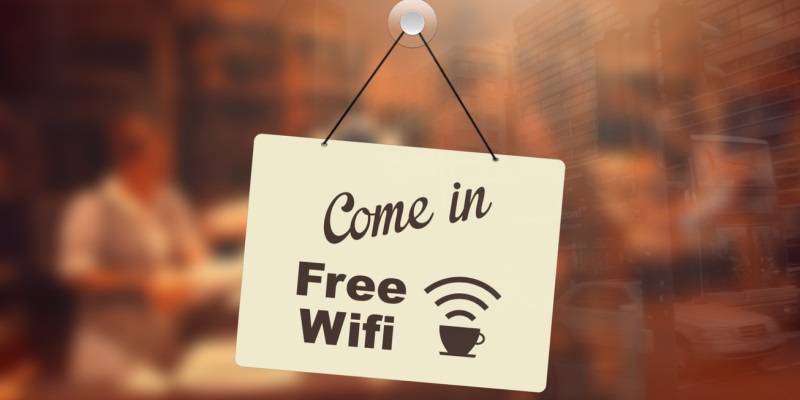Contents
- 1 Introduction
- 2 Importance of Wi-Fi and Internet Access in Hotels
- 3 Purpose of the Guide
- 4 Understanding Hotel Wi-Fi and Internet Access
- 5 How to Connect to Hotel Wi-Fi Network
- 6 Best Practices for Using Hotel Wi-Fi and Internet Access
- 7 What to Avoid When Using Hotel Wi-Fi and Internet Access
- 8 Conclusion
Introduction
The internet has become an essential part of our daily lives. From sending work emails to streaming movies and music, the internet is ubiquitous and plays a crucial role in keeping us connected with the world.
When traveling, having access to Wi-Fi can be a real game-changer in terms of staying connected with work, friends, family, and the wider world. That’s why it’s no surprise that access to Wi-Fi and internet has become one of the most critical factors when choosing a hotel.
Importance of Wi-Fi and Internet Access in Hotels
In today’s digital age, it is almost impossible to imagine life without the internet. Whether you are traveling for business or pleasure, having access to fast and reliable Wi-Fi has become an essential part of hotel amenities.
Not only does it enable easy communication with loved ones back home but also allows travelers to stay productive while on-the-go. For business travelers, having access to internet connectivity can make all the difference between success or failure on their trip.
Meetings can be scheduled online; presentations can be sent over email; documents can be shared via cloud services — all made possible by reliable internet connections. For leisure travelers, hotel Wi-Fi is equally important as they look forward to uploading photos on social media accounts or streaming videos in their leisure time after a long day’s adventure.
Purpose of the Guide
The purpose of this guide is to provide you with all the information you need about using Hotel Wi-Fi and Internet Access safely while avoiding some common pitfalls that come with public networks. This guide will cover topics such as understanding different types of hotel networks, how to connect your device(s) safely, best practices for using hotel Wi-Fi network effectively & securely while avoiding any unethical activities online that could harm yourself or others. By following these guidelines provided here you can stay connected confidently when traveling away from home.
Understanding Hotel Wi-Fi and Internet Access
When you’re staying at a hotel, it’s important to understand the type of Wi-Fi network that you’re connecting to. There are two main types of hotel Wi-Fi networks: free and paid. Free networks are often slower and more limited in terms of bandwidth.
Paid networks usually offer faster speeds and more reliable connections. It’s important to note that not all hotels have the same kind of Wi-Fi network.
Some hotels offer both free and paid options, while others only offer one or the other. When booking your stay, make sure to check what kind of Wi-Fi network is available so you can plan accordingly.
Types of Hotel Wi-Fi Networks
There are several types of hotel Wi-Fi networks, including open networks, password-protected networks, and captive portal networks. Open networks do not require a password to connect, but they are also the least secure option as anyone can access them.
Password-protected networks require a password to connect and provide some level of security. Captive portal networks require users to log in through a web page before they can access the internet.
Speeds and Bandwidth Limitations
Hotel Wi-Fi speeds can vary greatly depending on the location, size of the hotel, number of guests using it at any given moment, etc. It’s important to remember that just because a hotel offers free Wi-Fi doesn’t necessarily mean it will be fast or reliable enough for your needs. Additionally, many hotels place bandwidth limitations on their guests’ internet usage in order to prevent overload on their systems which can negatively impact speeds for everyone accessing their system at once.. Be sure to check with your hotel’s front desk if there are any restrictions or regulations about data usage during your stay so you don’t accidentally go over any limits.
Security Concerns
When using hotel Wi-Fi, security should be a top priority. Connecting to a public network means you are sharing the same network with other guests, which makes it much easier for hackers to access your personal information. To protect yourself, make sure you only access secure websites that begin with “https” and avoid entering any sensitive information such as credit card numbers or passwords while on public networks.
It’s also recommended to use a virtual private network (VPN) when connecting to hotel Wi-Fi as it encrypts your internet traffic and enhances privacy while roaming on public networks. Many paid VPN providers offer their services for just a few dollars per month which can make them an affordable way to provide added protection while traveling.
How to Connect to Hotel Wi-Fi Network
Connecting to hotel Wi-Fi is usually a straightforward process, but each hotel may have slightly different steps. Before attempting to connect, it’s important to obtain the necessary login credentials from the front desk. The login details will typically include the network name (SSID) and password.
Some hotels may also require a unique username or room number to access the network. Once you have obtained the login details, you can proceed with connecting your device to the hotel Wi-Fi network.
First, make sure that your device’s Wi-Fi settings are turned on. This can usually be done by swiping down from the top of your screen and tapping on the Wi-Fi icon.
Obtaining Login Credentials from the Front Desk
Some hotels may provide this information on a paper slip, while others will give it to you verbally. Make sure to double-check that you have all of the necessary information before leaving the front desk.
Connecting to the Network on Your Device
After ensuring that your device’s Wi-Fi is turned on and that you have obtained all necessary login details, search for available networks and select your hotel’s network from among them. You’ll then be prompted to enter the password or other necessary credentials.
If your device shows an error message or indicates that it cannot connect to the network, try resetting both your device and router/modem first. If this doesn’t work, ask for assistance from hotel staff.
Troubleshooting Common Connectivity Issues
Sometimes even after following all these steps carefully problems still arise due which user couldn’t connect properly with Hotel Wifi network. This happens mostly because of poor signal strength or connectivity issues which are mostly outside of our control but we can try couple things in order for better connectivity:
- If possible make sure there isn’t any metal object between your device and Wi-Fi router.
- Try rebooting the router/modem
- Disable the unused devices which are connected to same network, as they may cause interference with the speed of your current device.
By taking these steps, you should be able to successfully connect to the hotel Wi-Fi network and start enjoying high-speed internet access. If you continue to experience issues despite following these steps, reach out for help from your hotel staff or technical support.
Best Practices for Using Hotel Wi-Fi and Internet Access
Avoiding Sensitive Transactions on Public Networks
While hotel Wi-Fi can be convenient, it is important to keep in mind that public networks are not always secure. As such, it is best to avoid sensitive transactions when connected to these networks. This includes things like online banking, accessing your email or social media accounts, and making purchases using your credit card.
If you must carry out sensitive transactions, use your mobile data or wait until you get home where you can use a secure network. It is also helpful to check that the website you are using has HTTPS encryption, which provides an added layer of security for your data.
Using a VPN for Added Security
A Virtual Private Network (VPN) encrypts all of the data sent between your device and the internet. When you use a VPN on a public network like hotel Wi-Fi, it creates a secure tunnel for all of your internet traffic. This means that even if someone intercepts your traffic while you are connected to the public network, they will not be able to read it.
There are many VPN providers available today; some are free while others require payment. Before selecting one, read reviews from reputable sources and do thorough research into their privacy policies to ensure they do not keep logs of user activity.
Monitoring Data Usage to Avoid Overages
Most hotels offer limited bandwidth usage per day per room. It is essential to monitor data usage regularly while connected to the hotel’s Wi-Fi network in order not exceed this limit and avoid additional charges on your bill. To monitor data usage on most smartphones and computers:
– Go to Settings > Network & Internet > Data Usage – Set limits or alerts for high usage
– Reset statistics at the beginning of each day You may also consider downloading apps like “Datally” (Android) or “My Data Manager” (iOS), which can help you monitor your data usage even more closely.
Disconnecting From the Network When Not in Use
It is crucial to disconnect from the hotel Wi-Fi network when you are not actively using it. This will not only save bandwidth resources but also reduce the likelihood of unauthorized access to your device or data.
Additionally, some hotels may request that guests disconnect from the Wi-Fi network when they leave their rooms. This is especially important if you have a lot of data-sensitive files on your device, such as business documents or private photos.
By disconnecting, you minimize the risk of someone gaining access to these files without permission. By following these best practices for using hotel Wi-Fi and internet access, you can ensure that your data remains safe and secure while enjoying the convenience of being connected on-the-go.
What to Avoid When Using Hotel Wi-Fi and Internet Access
Streaming Videos or Downloading Large Files: A Recipe for Disaster
While it may be tempting to catch up on your favorite show or download a large document while staying in a hotel, it is important to remember that most hotel Wi-Fi networks are not designed to handle large amounts of data usage. Streaming videos or downloading large files can cause the network to slow down significantly, making it difficult for other guests to use the internet.
Additionally, many hotels place limits on the amount of data that can be used per day, so downloading large files or streaming videos could result in costly overage charges. To avoid these issues, try to limit your data usage while using hotel Wi-Fi.
If you must stream a video or download a file, consider doing so during off-peak hours when fewer people are likely to be using the network. Alternatively, you could use your own mobile data plan if you have enough available data.
Accessing Unsecured Websites or Email Accounts: A Security Risk
When using a public network like hotel Wi-Fi, it is important to take extra precautions with your online security. Accessing unsecured websites or email accounts can leave you vulnerable to hackers who may be able to intercept your personal information such as passwords and credit card numbers.
To avoid these risks, make sure that any website you visit starts with “https” instead of “http” as this indicates that the site is secure and encrypts information between the website and your device. Additionally, consider using two-factor authentication when logging into sensitive accounts such as email or banking sites.
Sharing Personal Information Over Public Networks: Think Twice
It may be tempting to check social media accounts or post updates about your trip while connected to hotel Wi-Fi but think twice before sharing any personal information. Public networks are not always secure, and it is possible for hackers to intercept your information. To avoid this risk, limit the amount of personal information you share while using public networks.
Avoid logging into websites or accounts that contain sensitive information such as banking or credit card sites. Additionally, use caution when sharing personal information on social media platforms and consider waiting until you are on a secure network before posting updates about your trip.
Conclusion
Summary of Key Points
Using hotel Wi-Fi can be a convenient and cost-effective way to stay connected while on the road. However, it is important to understand the risks associated with public networks and take steps to protect yourself and your personal information. By following best practices such as avoiding sensitive transactions, using a VPN, and monitoring your data usage, you can minimize these risks.
It is also important to be aware of what behaviors to avoid when using hotel Wi-Fi such as streaming videos or downloading large files, accessing unsecured websites or email accounts, and sharing personal information over public networks. By being mindful of these potential pitfalls and taking steps to mitigate their impact, you can ensure that your experience using hotel Wi-Fi is safe and hassle-free.
Importance of Following Best Practices for Safe and Secure Use of Hotel Wi-Fi
Ultimately, the importance of following best practices for safe and secure use of hotel Wi-Fi cannot be overstated. With more people traveling than ever before and an increasing amount of sensitive information being stored online, it is critical that travelers take steps to protect themselves from cyber threats while on the road. By investing in a quality VPN service, educating yourself about potential security risks associated with public networks, and taking proactive measures such as limiting your data usage and avoiding potentially risky behaviors online like accessing unsecured websites or sharing personal information over public networks – you can help ensure that your experience using hotel Wi-Fi is both safe and enjoyable.













